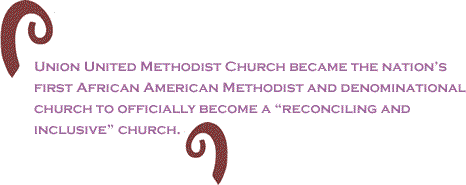February 1 began Black
History Month, a national annual observance since 1926,
honoring and celebrating the achievements of African-Americans
and their institutions.
The
one institution least expected to be lauded among LGBTQ
people of African descent in the month-long celebration
is the Black Church.
In
this ongoing cacophony of anti-gay rhetoric from fire
and brimstone, bible-thumping ministers are those courageous
few who not only reminisce about their march with Rev.
Dr. Martin Luther King Jr. during the 1960s civil rights
movement, but those who also continue to uphold the message
of King�s social gospel by fighting for LGBTQ civil rights.
Too
often, we hear African American ministers espouse that
they are fierce proponents of LGBTQ social justice issues
but are stymied by their parishioners and church polity.
Not all churches, however, allow homophobic churchgoers
or ecclesial powers to stand in the way.
 Union
United Methodist Church (UUMC), a predominately African
American congregation located in Boston�s South End -
the epicenter of the city�s LGBTQ community - is one of
them.
Union
United Methodist Church (UUMC), a predominately African
American congregation located in Boston�s South End -
the epicenter of the city�s LGBTQ community - is one of
them.
When
Hilda Evans, a parishioner of UUMC, suggested in 1996
the church opens its doors to the entire Boston�s South
End community, four later years later it did. And on February
15, 2000, Union United Methodist Church, led by the now
retired Rev. Theodore L. Lockhart, became the nation�s
first African American Methodist and denominational church
to officially become a �reconciling and inclusive� church.
Union�s
church council adopted an unanimous resolution to enthusiastically
welcome LGBTQ worshippers along with a statement announcing
that UUMC �...affirm the full participation in all aspects
of our church life of all who confess Jesus Christ as
Lord and Saviour, regardless of their race, color, physical
challenge, sexual orientation and/or affectional orientation.�
�The
vote by Union United Methodist Church shows that even
within the more strict religious institutions there is
a diversity of opinions on gay and lesbian issues,� said
Donna Payne in 2000, the then HRC field organizer, working
with people of color and the religious community. �Religious
views on homosexuality are not monolithic, and people
of faith are increasingly speaking out in favor of full-inclusion
for gay and lesbian worshipers in churches, synagogues
and mosques throughout America.�
McLee
had hoped UUMC would serve as an example for other black
churches on how to talk to the black community about homosexuality.�
We need to have a serious conversation about sexuality
in our community,� McLee told Boston�s black own newspaper,
the Bay State Banner in 2002. �If we continue to marginalize
our gay brothers and sisters, we are going to isolate
them. It�s not holy.�

Whereas
most black churches, locally and nationally, are silent
and/or inactive on the HIV/AID epidemic ravaging their
communities, UUMC continues to be an ally to this community.
For example, before she died of AIDS, community AIDS activist
Belynda Dunn, 49, brought frank talks about AIDS to the
black church. And she did it first at UUMC.
�...
Belynda really lit a fire under me...That�s what Belynda
did with everyone. She really helped us cross ideological
lines and theological lines and not get hung up on the
homosexual issue. She said to the black church: �Get over
it,�� her pastor the then Reverend Martin McLee.
UUMC
was the first black church, and to date the only, to host
Boston�s Annual Gay Pride Interfaith Prayer service, and
to have a �Happy Pride� sign posted in front of the church.
��Gay
folk have always been in the black church and the white
church - that�s not new - but we don�t require folk to
pretend that they�re not who they are,�� Rev. Martin D.
McLee, who served UUMC for eight years, told the Boston
Globe in 2008. Since the church became �reconciling and
inclusive,� the congregation has hosted a gospel brunch
after Sunday worship during Pride weekend for the African
American community. McLee has left UUMC, but the fight
for LGBTQ civil rights continues on now with the Rev.
LaTrelle Miller Easterling, the first female pastor in
the church�s 190-year history.
In
June 2011, more than 100 Methodist ministers in New England
have pledged to marry gay couples in defiance of the denomination�s
ban on same-sex unions.
Approximately
1 out of 9 Methodist clerics signed a statement pledging
to open their churches to LGBTQ couples that stated, �We
repent that it has taken us so long to act...We realize
that our church�s discriminatory policies tarnish the
witness of the church to the world, and we are [complicit].��The
Rev. Easterling signed the statement saying, she could
not in good conscience deny a practicing member of her
church her marriage blessing because the person is gay.�
We�re laying on the line our ordination that many of us
have worked four to eight years to get, as well as the
expense and time of the seminary,�� Easterling told the
Globe. �I certainly stand by this movement.��
UUMC
is a movement, and it�s an example, not just regionally
to black churches in Boston.

BlackCommentator.com
Editorial Board member, the Rev. Irene Monroe, is a religion
columnist, theologian, and public speaker. She is
the Coordinator of
the African-American Roundtable
of the Center for Lesbian and Gay Studies in Religion
and Ministry (CLGS) at the Pacific School of Religion. A
native of Brooklyn, Rev. Monroe is a graduate from Wellesley
College and Union Theological Seminary at Columbia University,
and served as a pastor at an African-American church before
coming to Harvard Divinity School for her doctorate as
a Ford Fellow. She was recently named to MSNBC�s list
of 10 Black Women You Should Know. Reverend Monroe is the author
of Let Your Light Shine Like a Rainbow Always: Meditations on Bible Prayers for Not�So�Everyday Moments. As an African-American feminist theologian,
she speaks for a sector of society that is frequently
invisible. Her website is
irenemonroe.com.
Click here
to contact the Rev. Monroe.

